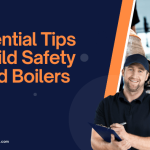1. Understand How Your Boiler Works
Before diving into safety, it’s essential to understand the basics of how your boiler operates. A boiler heats water or produces steam for heating a home. This process involves several components, including the burner, heat exchanger, and controls. Familiarizing yourself with these elements can help you recognize when something isn’t working correctly.
Did You Know?
Understanding your boiler’s components can empower you to notice irregularities early, potentially saving you from costly repairs.
FAQs:
- What type of boiler do I have?
Check the boiler’s manual or the manufacturer’s label for information on the model and type (e.g., combi, system, or conventional). For more information on different types, refer to top benefits of choosing combi boilers and system boilers. - Where can I find more resources on boiler operation?
The U.S. Department of Energy provides a wealth of information about different heating systems.
2. Regular Maintenance is Key
Just like any other appliance, your boiler requires regular maintenance to function efficiently and safely. Schedule a professional inspection at least once a year. This check-up can help identify any potential issues before they become major problems.
Quick Tip:
Keeping a record of maintenance dates can help you stay organized and ensure you don’t forget any essential service appointments.
Maintenance Checklist:
| Task | Frequency | Responsible Party |
|---|---|---|
| Annual professional service | Annually | Certified technician |
| Check pressure relief valve | Monthly | Homeowner |
| Inspect vents for blockages | Monthly | Homeowner |
| Bleed radiators | As needed | Homeowner |
FAQs:
- What happens during a boiler service?
A technician will inspect, clean, and test all components of the boiler to ensure optimal performance. For a comprehensive guide, see essential pre-installation checklist for your new boiler. - How much does boiler maintenance cost?
The average range for a maintenance service is between $100 to $200, depending on your location and the type of boiler.
3. Check for Carbon Monoxide Leaks
Carbon monoxide (CO) is a silent killer. It is colorless, odorless, and tasteless, making it particularly dangerous. To protect yourself and your family, install carbon monoxide detectors near bedrooms and common areas. Make sure they are functioning correctly, and check them monthly.
Safety Reminder:
If your CO detector beeps or you suspect a leak, evacuate your home immediately and call emergency services. Your safety is the top priority!
Signs of CO poisoning:
- Headaches
- Dizziness
- Nausea
- Confusion
FAQs:
- How often should I replace my CO detector?
Most CO detectors have a lifespan of 5-7 years. Check the manufacturer’s guidelines for specific details. - Where can I learn more about carbon monoxide safety?
The Centers for Disease Control and Prevention (CDC) offers extensive information on CO safety and prevention.
4. Ventilation Matters
Proper ventilation is crucial for your boiler to operate safely and efficiently. Ensure that vents are unobstructed and that air can flow freely around the boiler. This will help prevent overheating and ensure that harmful gases are expelled safely.
Pro Tip:
Regularly inspect exhaust pipes for corrosion or blockages, especially after harsh weather conditions, to maintain safe operation.
Ventilation Tips:
- Keep vents clear of obstructions, like furniture or drapes.
- Inspect exhaust pipes regularly for corrosion or blockages.
- Ensure that air intake vents are not blocked by snow or debris during winter storms.
FAQs:
- How can I check if my boiler has proper ventilation?
Look for signs of soot or discoloration around the boiler, which may indicate poor ventilation. - What should I do if I find a blockage?
Clear the blockage immediately and consult a professional if you notice persistent issues.
5. Inspect Your Boiler and Radiators
In winter, your boiler and radiators work overtime to keep your home warm. Regularly inspecting these components can help catch problems early. Check for leaks, rust, or unusual noises, which could indicate a malfunction.
Maintenance Insight:
Taking a few minutes each month to inspect your boiler and radiators can save you headaches down the line!
Inspection Checklist:
- Look for visible leaks around the boiler and pipes.
- Check radiators for cold spots, which may indicate trapped air.
- Listen for unusual sounds, like banging or hissing.
FAQs:
- How do I bleed a radiator?
Use a radiator key to open the bleed valve slightly until water starts to escape, then close it to release trapped air. For more guidance, check out top 5 tips for boosting your boiler efficiency. - What should I do if I find a leak?
Turn off the boiler and contact a qualified technician for repairs.
6. Know How to Respond to Emergencies
In case of a boiler emergency, knowing how to respond can save lives and prevent further damage. Familiarize yourself with the emergency shut-off valve, and ensure everyone in your household knows its location.
Emergency Preparedness:
Having a plan and knowing emergency procedures can make all the difference in a crisis.
Emergency Response Steps:
- Turn off the boiler immediately.
- Evacuate the premises.
- Call emergency services if necessary.
- Do not re-enter the building until it has been deemed safe.
FAQs:
- What constitutes a boiler emergency?
Signs include uncontrollable leaks, strange noises, or the smell of gas. - Should I attempt to fix the boiler myself?
No, always call a professional for repairs. For professional guidance, see professional vs DIY boiler installation.
7. Consider Upgrading Older Systems
If your boiler is over 15 years old, it may be time to consider an upgrade. Modern boilers are more efficient, safer, and can save you money on energy bills. Look for models with the ENERGY STAR label for the best efficiency. For insights on new technologies, check out top 5 smart boilers revolutionizing home heating.
Upgrade Benefits:
Investing in a new boiler can lead to long-term savings and improved comfort in your home.
Benefits of Upgrading:
- Improved safety features
- Increased energy efficiency
- Better heating control
FAQs:
- How do I decide if I need a new boiler?
Consider factors like age, efficiency, and repair costs. A professional can help assess your situation. - What are the best options for new boilers?
Research brands like Bosch, Vaillant, and Worcester Bosch for reliable and efficient models. For comparisons, refer to Worcester Bosch boilers and Vaillant boilers.
Conclusion
Keeping your boiler safe and well-maintained during winter is essential for your home’s comfort and safety. By following these seven tips, you can ensure that your boiler operates efficiently while minimizing risks. Remember, when in doubt, always consult a professional. For more information on boiler safety, visit the American Gas Association.
Stay warm and safe this winter!





